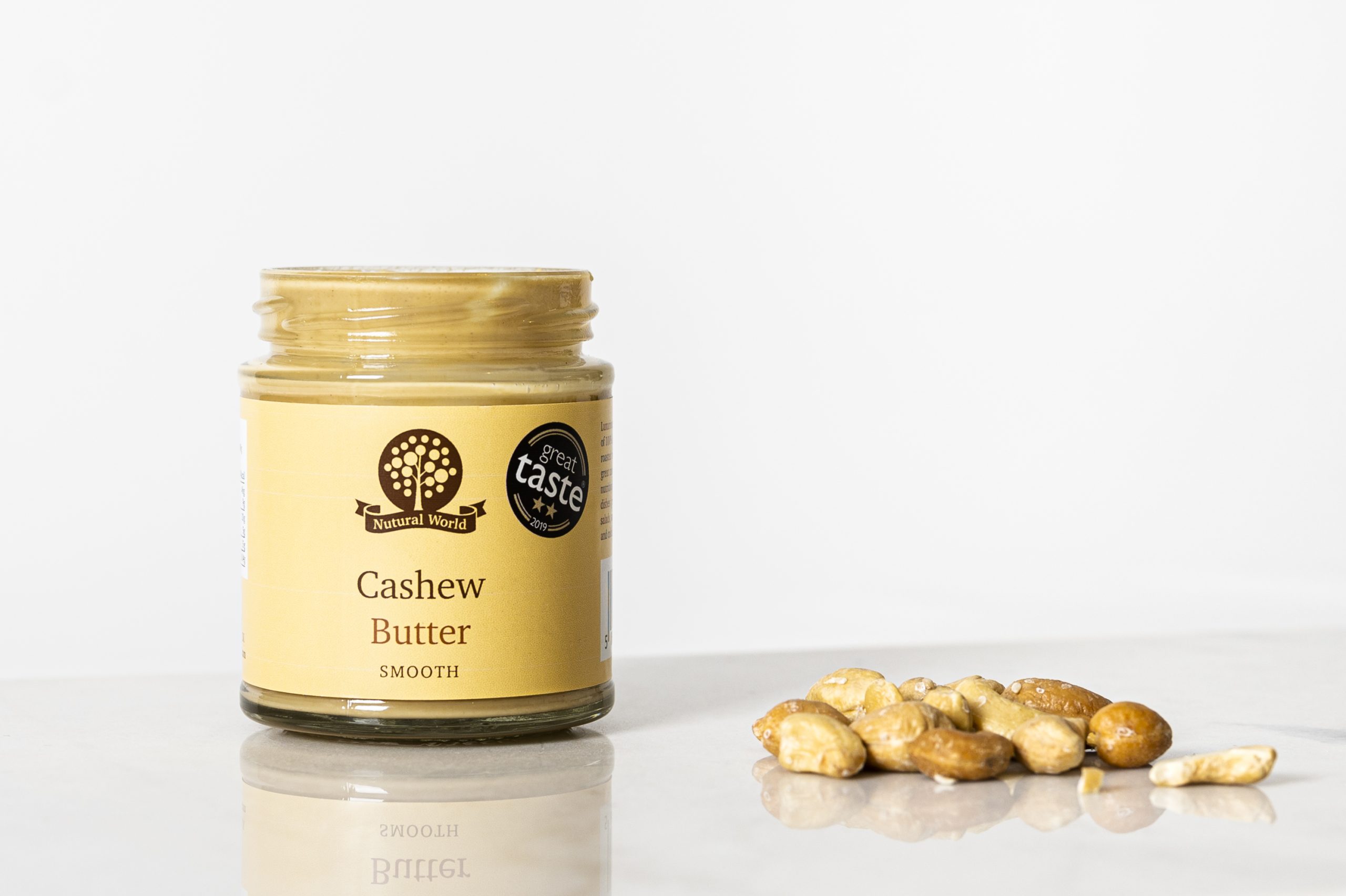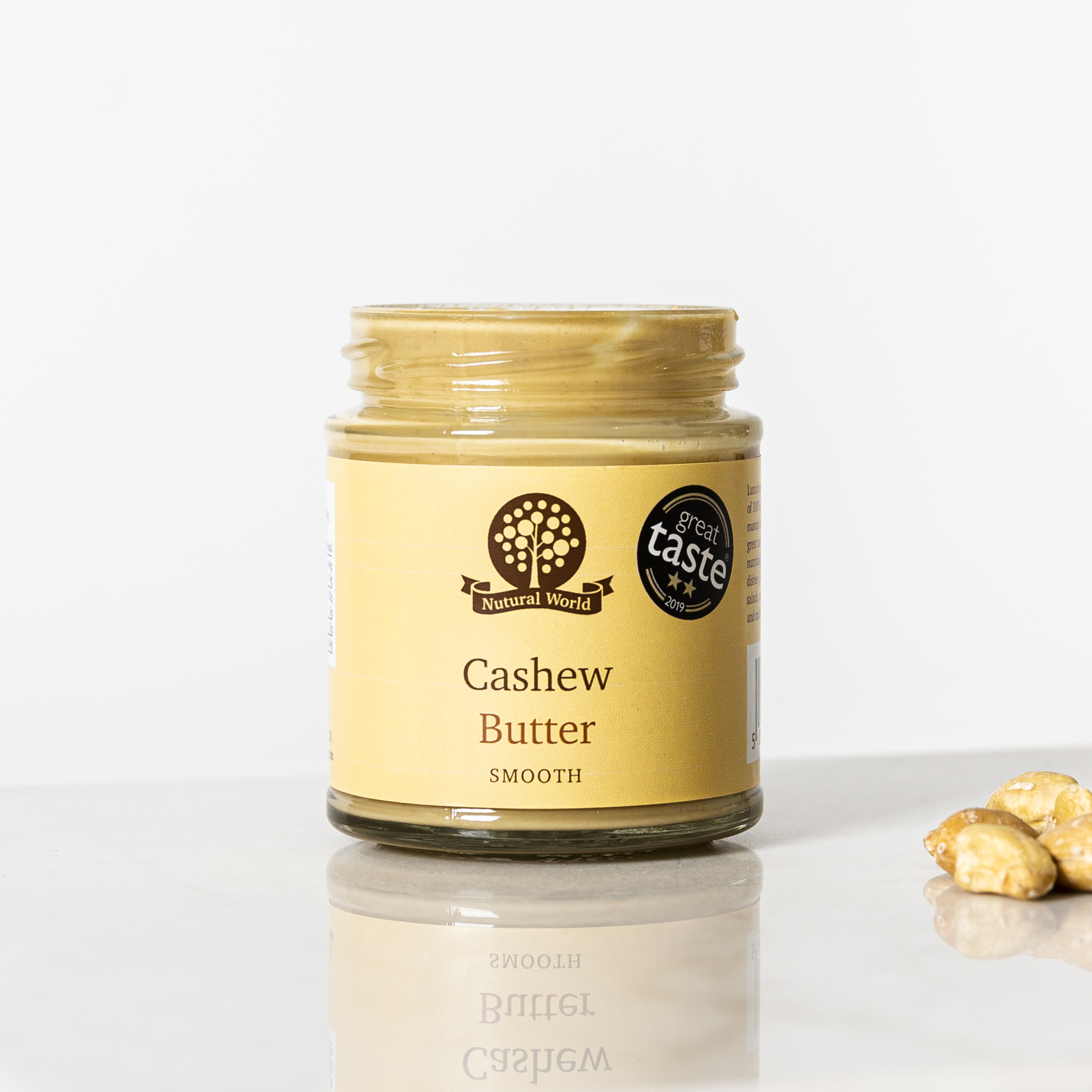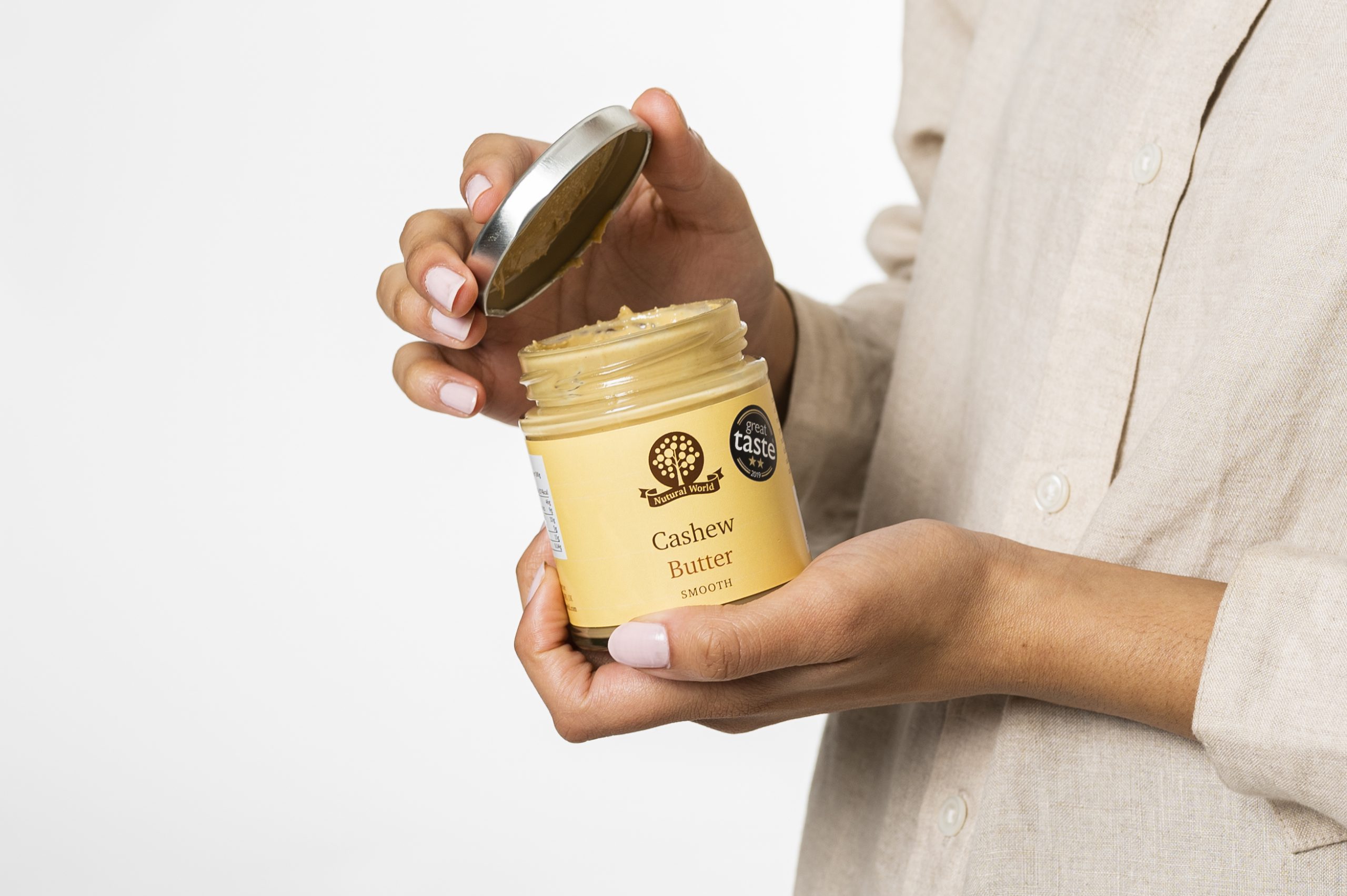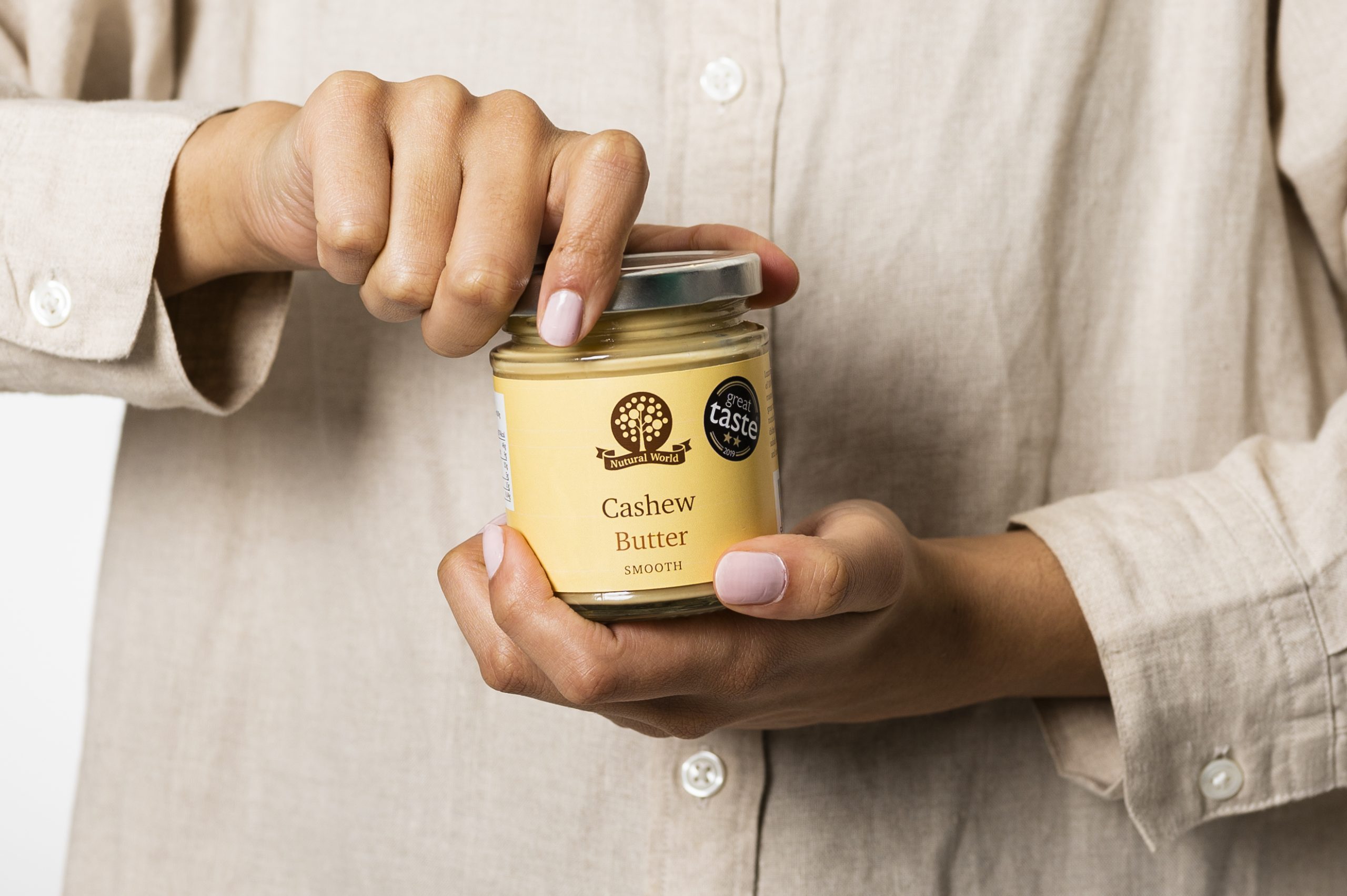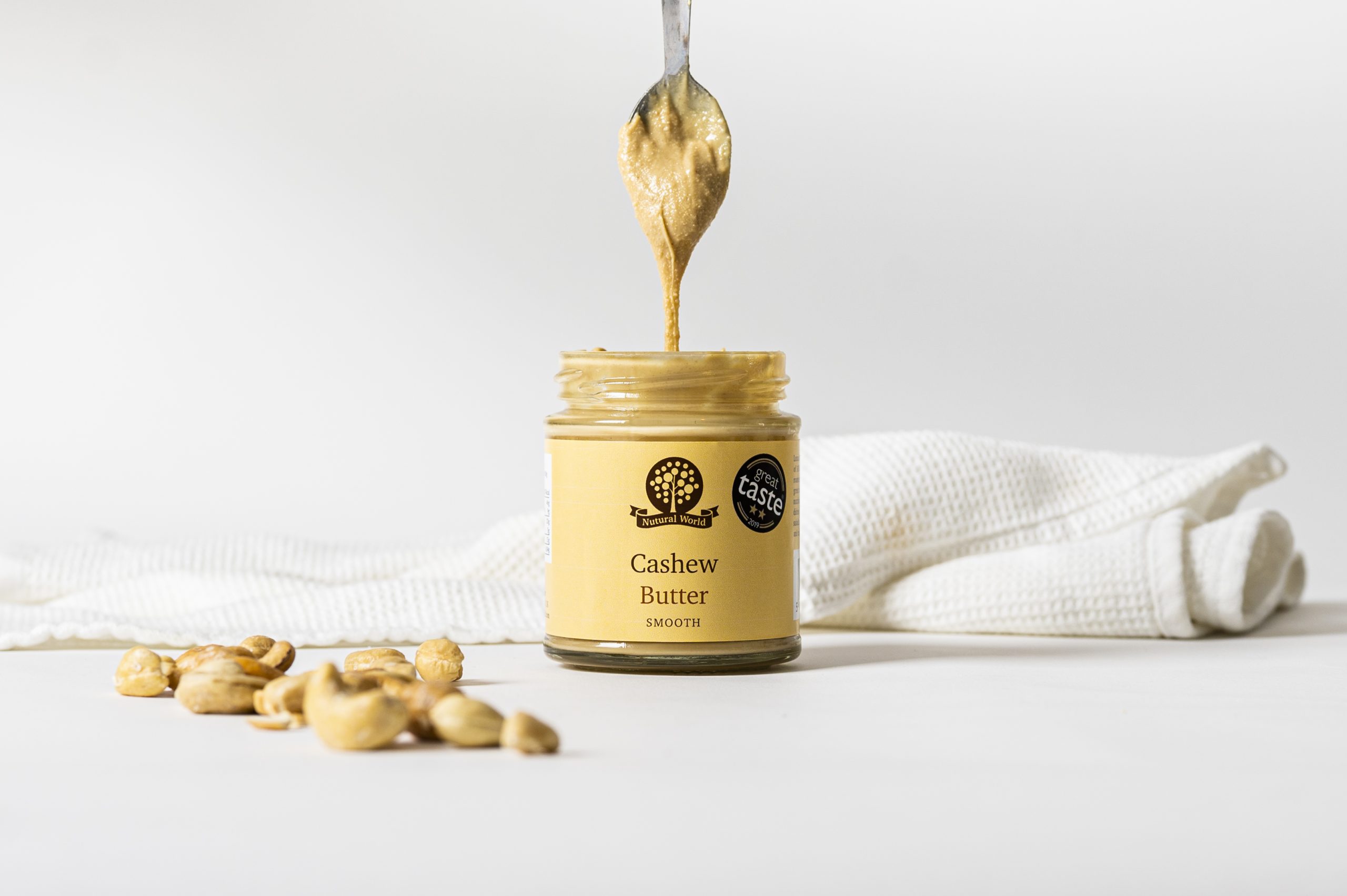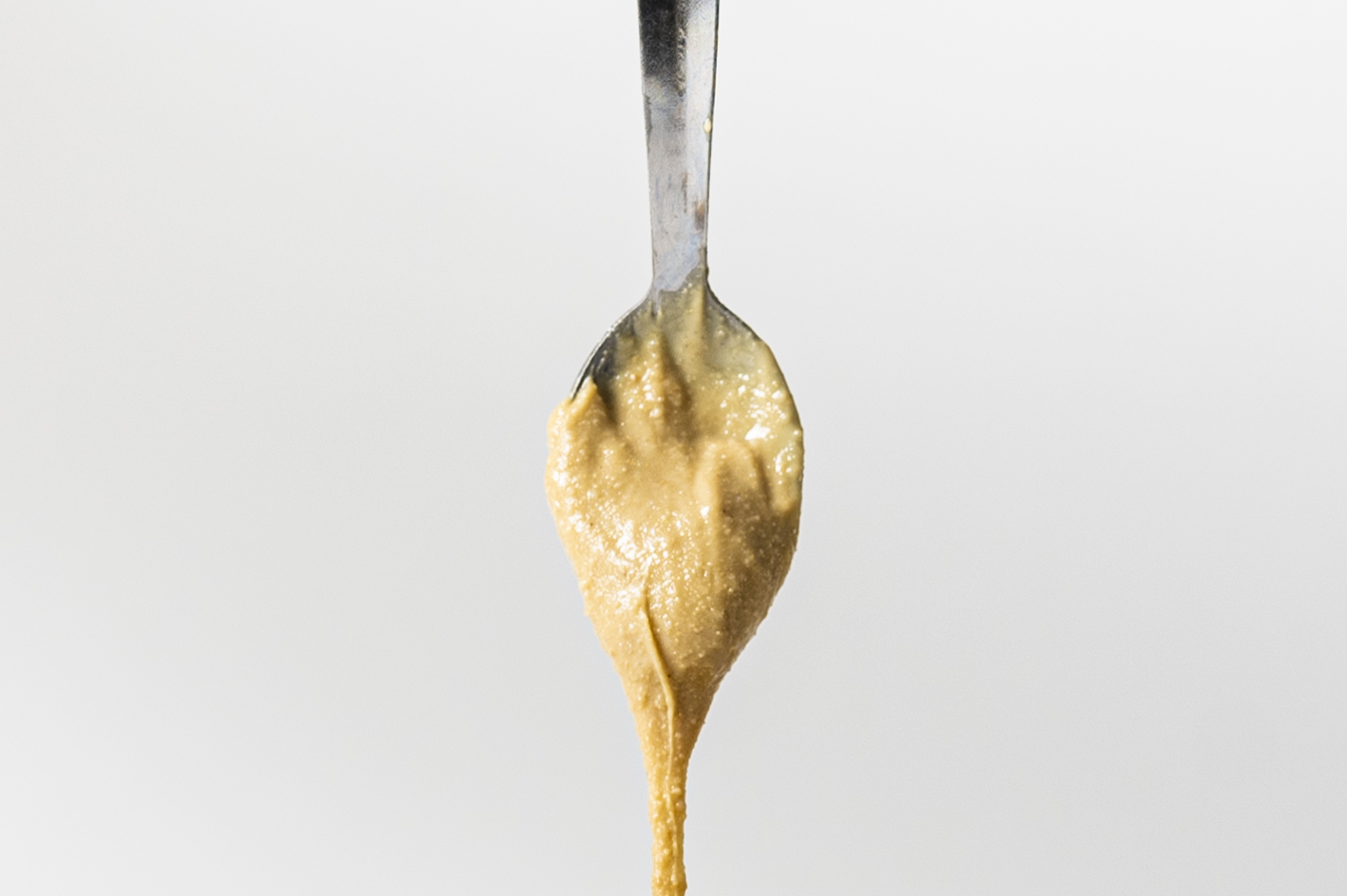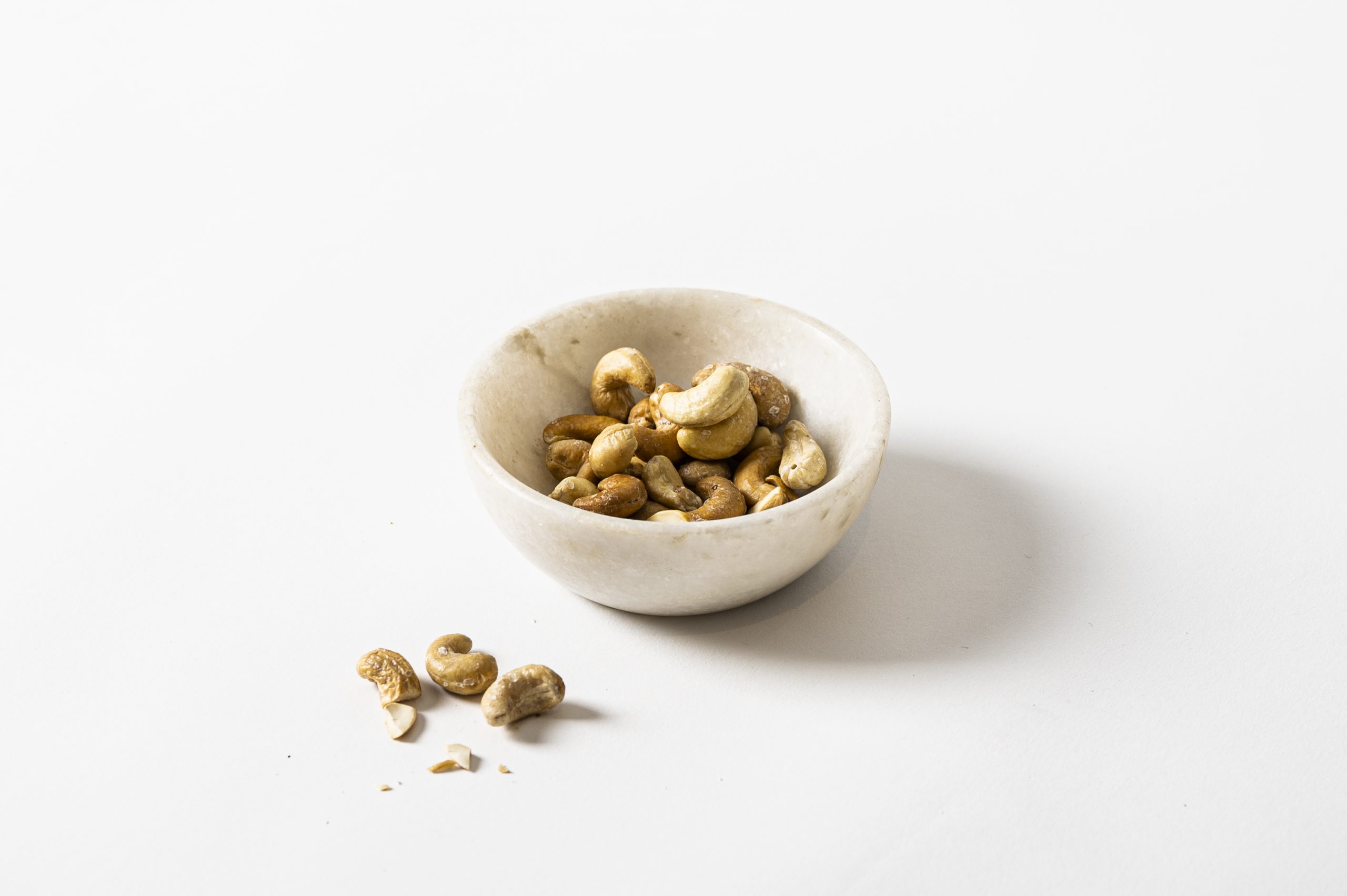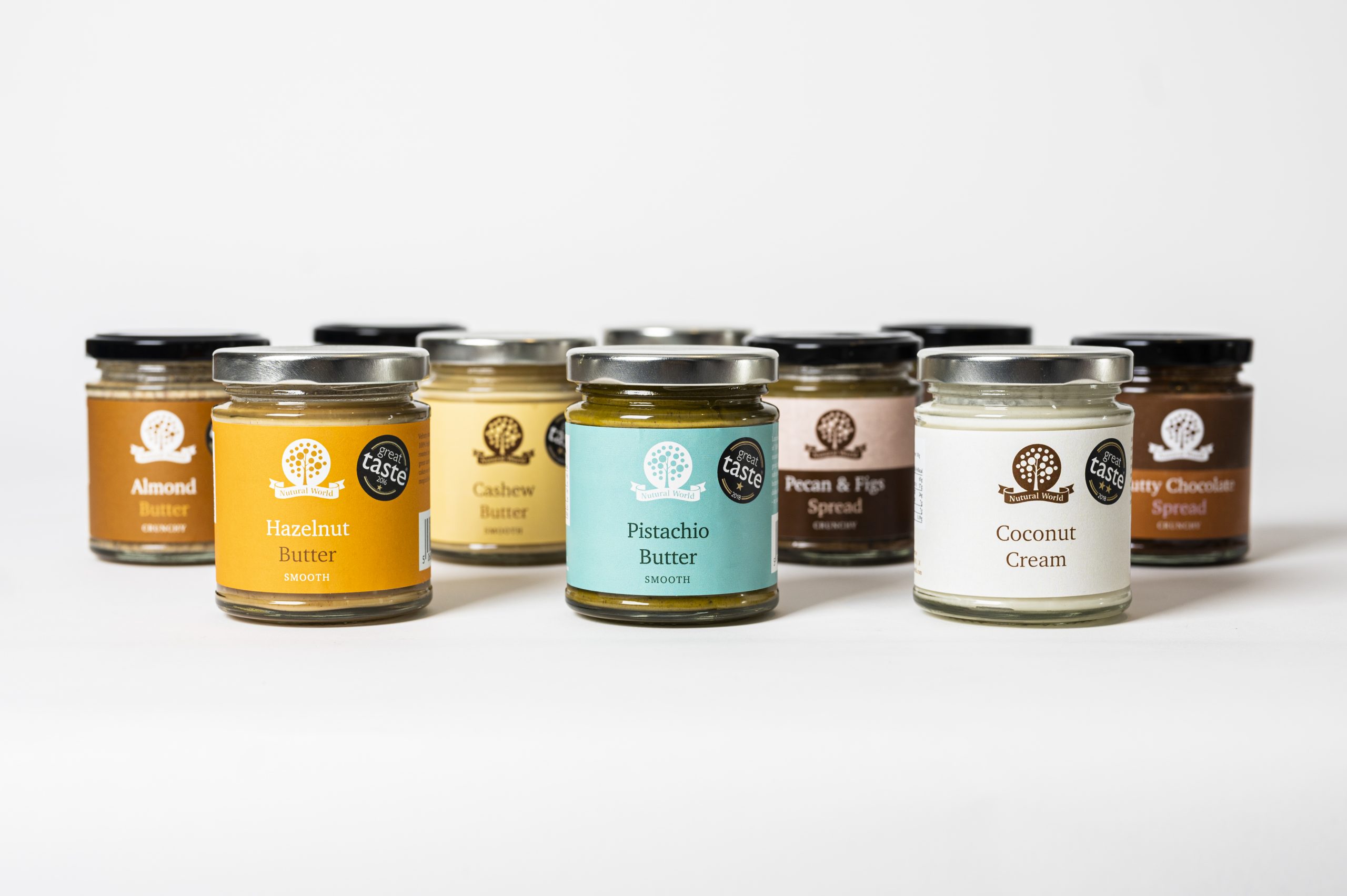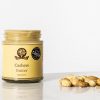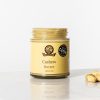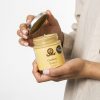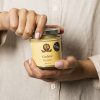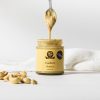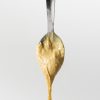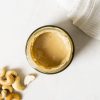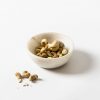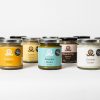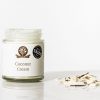Nutural World Cashew Butter (Smooth) – Large Tubs 5Kg
£72.20
A satisfyingly smooth spread made of 100% highest quality Cashew nuts, lightly roasted and stone-milled to preserve their great taste and aroma, mixed with Cashew nuts pieces. An excellent source of vitamins and minerals, this highly nutritious butter is healthy and enjoyable on its own (try it on toasted bread) or as an ingredient in other dishes.
Out of stock
Delivery Options:
- Next Day Tracked: £2.49 per order
- Click & Collect in London: FREE
Both the Smooth and the Crunchy varieties are made of 100% highest quality cashew nuts – and nothing else. The nuts are lightly toasted and stone-milled to a fine paste. They differ in texture only. While the Smooth contains just the paste of grounded cashew nuts, the Crunchy is mixed with bits of broken cashews, adding highly palatable “crunchiness” to the taste. Each jar contains 170g.
Culinary Use
In general, Cashew Butter can be used wherever and whenever one would otherwise use peanut butter. It does have, though, a very distinctive taste quite different from the peanut butter (for more about the differences between the two from the nutritional point of view see below). It is fabulous on it’s own, spread on freshly toasted bread. As the product is made of 100% cashew nuts, without any additives whatsoever, you may wish to add a pinch of salt and/or some drops of honey, maple syrup or sugar to suit your taste.
Cashew Butter can be used as an ingredient in salad dressing or as an original dip (prepared like Tahini). Both varieties can be used to enhance stir fries and oriental dishes such as Thai chicken curry and chicken satay. For desserts and sweet treats, Cashew Butter has a respectable range of uses as a main ingredient in baking cookies, fudge, etc. The use is really only bound by your imagination! You can, of course, do some online research too…
Health Benefits
Wikipedia states the following health benefits of Cashew Butter: The fats and oils in cashew nuts are 54% monounsaturated fat (18:1), 18% polyunsaturated fat (18:2), and 16% saturated fat (9% palmitic acid (16:0) and 7% stearic acid (18:0)). Cashews, as with other tree nuts, are a good source of antioxidants. Alkyl phenols, in particular, are abundant in cashews. Cashews are also a good source of dietary trace minerals copper, iron and zinc.can
Another online source claims the following benefits associated with eating cashew nuts:
- Cashews are high in calories. 100g of nuts provide 553 calories. They are packed with soluble dietary fibre, vitamins, minerals and numerous health-promoting phyto-chemicals that help protect from diseases and cancers.
- They are rich in “heart-friendly” monounsaturated-fatty acids like oleic, and palmitoleic acids. These essential fatty acids help lower harmful LDL-cholesterol while increasing good HDL cholesterol. Research studies suggest that a Mediterranean diet, which is rich in monounsaturated fatty acids, help to prevent coronary artery disease and strokes by favouring healthy blood lipid profile.
- Cashew nuts are a very rich source of essential minerals. Minerals, especially manganese, potassium, copper, iron, magnesium, zinc and selenium, are concentrated in these nuts. A handful of cashew nuts a day in the diet would provide enough of these minerals and prevent deficiency diseases. Selenium is an important micronutrient which functions as a co-factor for antioxidant enzymes such as Glutathione peroxidases, one of the most powerful antioxidants in the body. Copper is a co-factor for many vital enzymes, including cytochrome c-oxidase and superoxide dismutase (other mineral functions as co-factors for this enzyme are manganese and zinc). Zinc is a co-factor in many enzymes that regulate growth and development, sperm generation, digestion, and nucleic acid synthesis.
- Cashews are also rich in many essential vitamins such as pantothenic acid (vitamin B5), pyridoxine (vitamin B-6), riboflavin, and thiamin (vitamin B-1). 100g of nuts provide 0.147 mg or 32% of daily-recommended levels of pyridoxine. Pyridoxine reduces the risk of homocystinuria, and sideroblastic anemia. Niacin helps prevent “pellagra” or dermatitis. Additionally, these vitamins are essential for metabolism of protein, fat, and carbohydrates at cellular levels.
- Furthermore, the nuts also contain a small amount of zea-xanthin, an important pigment flavonoid antioxidant, which is selectively absorbed into the retinal macula lutea in the eyes. It is thought to provide antioxidants and protective UV ray filtering functions, and helps prevent age-related macular degeneration (ARMD) in the elderly.
Nutrition Facts
Most of the calories (414 out of 587) are derived from the fat content. The good news is that the vast majority of that fat is of the GOOD variety! The chart below shows the proportion of good fats (green) in cashew in relation to bad fats (in red). Read more about each type of fat and fatty acid below.
The chart below shows good fats in Nuts, Cashew Butter, plain, without salt added in relation to bad fats.
Polyunsaturated Fats: Polyunsaturated fat can be found mostly in nuts, seeds, fish, algae, leafy greens, and krill. Whole food sources are always best, as processing and heating may damage polyunsaturated fats.
Monounsaturated Fats: Foods containing monounsaturated fats reduce LDL (bad) cholesterol, while possibly increasing HDL (good) cholesterol. [“You Can Control Your Cholesterol: A Guide to Low-Cholesterol Living”. Merck & Co. Inc.].
Trans Fatty Acids: The National Academy of Sciences has concluded there is no safe level of trans fat consumption. This is because any incremental increase in trans fat intake increases the risk of coronary heart disease. [Dietary Reference Intakes for Energy, Carbohydrate, Fibre, Fat, Fatty Acids, Cholesterol, Protein, and Amino Acids (Macronutrients). National Academies Press. p. 504].
Saturated Fats: Consumption of saturated fat is a risk factor for cardiovascular disease in the view of the Canadian Heart and Stroke Foundation, the American Heart Association, the British Heart Foundation, the National Heart Foundation of Australia, the National Heart Foundation of New Zealand and the World Heart Federation.
As noted above, Cashew Butter contains high concentrations of vital vitamins and minerals. See details below, along with the percentage of the Recommended Daily Intake (RDI) of each, provided by 100g of Cashew Butter:
| Vitamin Content | ||
|---|---|---|
| Serving Size: 100g or 3.5oz | ||
| Amount | RDI% | |
| Vitamin A | 0 IU | 0% |
| Vitamin B6 | 0.3 mg | 13% |
| Vitamin B12 | 0 mcg | 0% |
| Vitamin B12, Added | ~ | |
| Vitamin C | 0 mg | 0% |
| Vitamin D | 0 IU | 0% |
| Vitamin D2 | ~ | |
| Vitamin D3 | ~ | |
| Vitamin D (D2 + D3) | 0 mcg | 0% |
| Vitamin E (Alpha-tocopherol) | ~ | |
| Vitamin E, Added | ~ | |
| Vitamin K | ~ | |
| Thiamin | 0.3 mg | 21% |
| Riboflavin | 0.2 mg | 11% |
| Niacin | 1.6 mg | 8% |
| Pantothenic Acid | 1.2 mg | 12% |
| Folate | 68.0 mcg | 17% |
| Folate, Food | 68.0 mcg | |
| Folate, DFE | 68.0 mcg DFE | |
| Choline | ~ | |
| Betaine | ~ | |
| *Daily Value not established for starred items. ~Data not available for tilde (~) items. |
||
| Vitamin Data taken from https://nutritiondata.self.com/facts/nut-and-seed-products/3096/2#ixzz6ULiuCKn1 | ||
| Mineral Content | ||
|---|---|---|
| Serving Size: 100g or 3.5oz | ||
| Amount | RDI% | |
| Calcium | 43.0 mg | 4% |
| Iron | 5.0 mg | 28% |
| Magnesium | 258 mg | 64% |
| Phosphorus | 457 mg | 46% |
| Potassium | 546 mg | 16% |
| Sodium | 15.0 mg | 1% |
| Zinc | 5.2 mg | 34% |
| Copper | 2.2 mg | 110% |
| Manganese | 0.8 mg | 41% |
| Selenium | 11.5 mcg | 16% |
| Fluoride | ~ | |
| *Daily Value not established for starred items. ~Data not available for tilde (~) items. |
||
| Mineral Data taken from https://nutritiondata.self.com/facts/nut-and-seed-products/3096/2#ixzz6ULiuCKn1 | ||
Compared to Peanut Butter, Cashew Butter is higher in many minerals, including iron. A two tablespoon serving of Cashew Butter contains more than twice as much iron and copper as peanut butter. Two tablespoons contain more phosphorus and magnesium than peanut butter as well. A detailed comparison can be found here: http://www.livestrong.com/article/316756-cashew-butter-nutrition/
Allergies
Nutural World Cashew Butter is made in a peanut-free environment, and thus is completely safe for those with a peanut allergy. However, Nutural World produces other seed and nut based products, and while every effort is made to separate the production lines it cannot guarantee that the product is free of traces of other seeds and nuts.
Vegans and the Manufacturing Process
Nutural World Cashew Butter is made of 100% cashew nuts, and thus is suitable for vegetarians and vegans. The nuts are lightly roasted to enhance their taste and bring out their delicate aroma. The milling process uses traditional stone-based mills and not high speed rotating blades to generate the most uniform paste and keep the temperature during the milling process to the lowest possible. Since no emulsifier is added, it is quite normal for the oil in our products to separate to the top of the jar. Simply stir it back in. Once opened, storing the product in the refrigerator will slow down the separation process and the product will keep for up to three months.
Dieting, Weight Loss and Cashew Butter
It may come as a surprise, but Cashew Butter is actually very ‘diet friendly’ for some types of diets. The table below shows how suitable is this food for each of the main dieting options:
| Diet or Weight Loss Program | Score out of 100 (higher is better) |
| Higher Fibre, Low Fat Diet (e.g. Weight Watchers) | 70 |
| Athletic Diet – Low Fat, High Protein and Carbs | 0 |
| Low Fat Diet (e.g. Jenny Craig) | 0 |
| Low Carb Diet (e.g. Atkins Diet) | 68 |
| Low Cholesterol Diet | 13 |
| Low Sodium Diet | 98 |
| Low Glycemic Index Diet (e.g. South Beach Diet) | 79 |
| Low Protein Diet | 65 |
| Dimensions | 0.1 × 0.1 × 0.1 cm |
|---|

